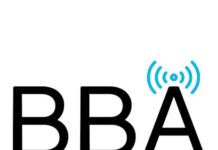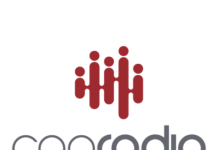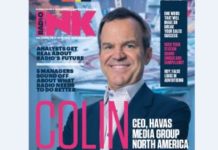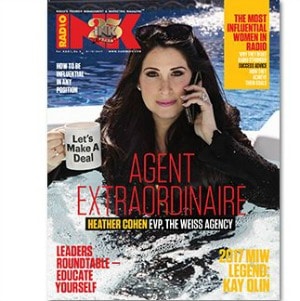
By Editor-In-Chief Ed Ryan
Heather Cohen started radio classes in high school, at age 14. Later, at Hofstra University, she joined the radio program as a freshman and quickly realized she didn’t want to be on the air — while she was on the air. “I was afraid,” she says. “I was nervous every single time I would hit that button. I was one of those ‘Please, God, don’t let me screw this shift up’ people. I was very nervous.”
Where she wanted to be was behind the scenes in radio, so she took the job as assistant news director, was promoted to news director, then served two full terms as station manager. “That was 40-plus hours a week, and it was a paid gig,” says Cohen. “I learned I was better at bossing people around, being organized, and keeping a hand in all aspects of the radio station, as opposed to being on the air, which I was not very good at.”
During her senior year of college, while on vacation with her family at Kutsher’s Country Club in the Catskills, the family ran into Larry Strickler, who was the director of activities at the resort. Larry is married to Shelly Strickler, who was a WOR newscaster and reporter, but joined her husband at the resort on her days off. Shelly tells Radio Ink about how her meeting Heather’s mom helped launch Heather’s career.
“I remember clearly the day a lovely woman approached me at a cocktail party at the hotel,” she says. “She told me her daughter, Heather, was studying broadcast journalism at Hofstra, and she wanted to know if I could give her advice or help in any way. I usually hesitate to recommend people for internships or jobs unless I know them very well and am sure through personal knowledge of their abilities.
“But I asked her mother to tell Heather to introduce herself to me. I was blown away. The instant I met Heather, I knew I would not only recommend but suggest strongly that she get an internship at WOR Radio. I just knew that this young woman was special.” Mom’s assertiveness worked. That meeting led to an interview with WOR PD David Bernstein, who brought Heather on for the internship.
After graduation Cohen was hired at WOR as a board op, and this young kid fresh out of college was working with John Gambling, Bob Grant, Dr. Joy Brown, Joan Hamburg, the Dolans, Joan Rivers, Joey Reynolds, and many others. After only three months of pressing buttons and making sure the top-of-the-hour ID went off correctly, Cohen recalls, Joan Hamburg needed a new producer.
“Joan at the time really did not want me,” she says. “I was a kid, 20 or 21, and I did not have a Rolodex. I didn’t know anyone, and she wanted someone who had been in the business and had a full Rolodex, who people knew, all the publicists knew. She did not want me. Let’s face it, I was less expensive at the time, and David Bernstein saw something in me and put me on probation. He said, ‘Don’t tell anyone how old you are, dress professionally, and let’s see how this works. If it doesn’t work out, you can go back to being a board op.”
Well, it worked out just fine, and very quickly, Heather and Joan bonded, and Cohen wound up producing Joan’s show for the next seven years. She would go on to become assistant PD at that legendary radio station and work closely with great broadcasters like GM Bob Bruno and owner Rick Buckley, and she began helping negotiate deals with talent. “It was a remarkable opportunity for a kid in her 20s,” she says. “All of sudden I’m in this office on Wall Street and helping run programming at this terrific heritage station. I loved every bit of it.”
Another opportunity came knocking around 2006. Several big-name broadcasters were putting together a female-based network called Greenstone. Even though she says she wanted to be at WOR forever, the network kept recruiting Cohen and finally made an offer she couldn’t refuse, for more money and more responsibility. Then, at a dinner being held for Dennis Miller as Miller was getting ready to launch into syndication, Cohen was seated next to Eric Weiss. They became friends and vowed to stay in touch.
Weiss predicted to Cohen that Greenstone would fold and told her, “You’ll be looking for a job, so when that happens, I want you to consider opening a New York office for the Weiss Agency.” She called him crazy at the time. A few months later, as Weiss predicted, Greenstone was gone and Heather was looking for a job.
In 2007 Cohen’s phone rang. It was Eric Weiss. “From the very first time I met Heather, I knew she would be great at talent representation,” says Weiss. “Her passion for both people and the radio business was extraordinary. I spent a lot of time convincing her to move from programming to agenting. And she spent a lot of time convincing me how many different offers of employment she had. When she created a bidding war for her own services, I knew for certain she was born to be an agent. Having her as EVP of the Weiss Agency is something I am grateful for every day.”
Cohen remembers making that decision to open up that New York office back in 2007. “There was something intriguing about the idea of being an agent,” she says. “It’s very entrepreneurial and scary, and I was used to going to a station or a network every day, wandering through studios. It was the scariest decision of my life, but it was the right decision, and I have never looked back for one second. I feel I have the best boss in the world. He’s remarkable, and I probably should have paid him for the first few years for all the training he did. I look at it like it was my master’s degree and Ph.D. all in one.
Radio Ink: What was it like breaking into radio at WOR in New York?
Cohen: It was incredible. I was so lucky. Thank God my mom had the courage to go over to Shelly Strickler. It did give me confidence. This was the station I listened to as a kid — I was pinching myself. I tried to learn everything about the station, not just on the programming side; I wanted to know something about everything. I was a total nerd. I couldn’t believe how lucky I was to be working at this station with these great people.
I have to say the staff was incredible — so many people took me under their wing. I’m grateful to the HR director, the operations manager, the chief engineer, the PD, the GSM, the GM, everyone. They all took the time to train me.
I don’t know that young people today get the same opportunity, with PDs doing six different jobs and every GM now being a market manager overseeing God knows how many stations. I was a lucky young person.
Radio Ink: What was it like working with Bob Grant?
Cohen: It was scary as hell. I was terrified of Bob. I can still hear him say, “Get off my phone, you fake phony fraud.” I was scared to make mistakes, and I did make them, and he didn’t like it. It was one of the most intimidating experiences ever. After a while I gained his respect, and eventually, when I was in the programming chair, and all those years as Joan Hamburg’s producer, I think we got along fine. But I was definitely scared of him.
I remember I cried once, which nobody saw because I ran to the bathroom, which by the way was on the outside perimeter. I cried within those first three months. I knew I messed up and he wasn’t happy and I didn’t want to disappoint him. I went to the bathroom and washed my face and I said, “Never again.”
Radio Ink: What was it like being Joan Hamburg’s producer?
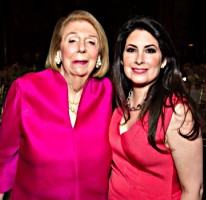
Cohen: I had a radio mom. It was hysterical. She made me laugh every single day. You know how Howard Stern is self-deprecating? So is Joan. From Joan I learned if you find a comfortable pair of shoes, buy them in every color, and then when you accidentally put on two different colors because you show up to work in the dark, you have to laugh at yourself.
I learned not to take myself that seriously with her, and that it was important to know a little bit about everything, to read everything. Those were the years I was out four nights a week, either at restaurants or the theater or seeing films before they opened. I became friends with all the publicists in New York, and it was incredible. I wanted to be a little Joan and know everything there was to know about the tri-state area.
Through laughter and self-deprecation, I learned the value of friendships. She prepped for hours, so I learned to prep. This was a time when research was not that easy, but this woman would research everything. To this day, she still does [Joan Hamburg is now on WABC]. I speak to her twice a week, and I’m lucky to be her agent. I learned how to have fun. That woman has shaped my life in ways I can’t even tell you. I love her so much.
Radio Ink: When Eric Weiss asked you open an office in New York, how did you get that rolling?
Cohen: That was scary. I wanted to impress him and do a good job. I realized he was taking a huge risk on somebody who never did that before. I talked to everyone, followed up with everyone, and showed up at every industry event. I’ve never been afraid to walk over and say hello to someone, so I networked like crazy. I was on the phone night and day. I probably worked on things I wouldn’t today, but I learned from them.
Today I may not focus on a lot of weekend shows unless they have a very significant quarter hour, but at the time I started from scratch and learned different aspects of the business and slowly took on a client here and another one there, helped Eric with projects, did a little consulting through the agency.
I think after a year, a lot of decision-makers started to realize “Heather’s an agent now, and maybe we will call her when we have an opening and ask who they have that matches this particular opening.” People hear you’re working with so-and-so and call to say, “Hey, I’m considering signing with an agent,” and it takes off from there.
The first few years were challenging. 2008 came quickly, a few months into my being an agent, and the world turned upside down. It took longer than I wanted to build the business up, but a few years into it, and I realized this is what I would be doing the rest of my life.
Radio Ink: Tell us about how you negotiate for a client.
Cohen: Whether it’s somebody making $100,000 or $1.5 million, it’s the same to me. I want to do the very best for my clients. I remember doing a deal for Montel Williams for Air America, and Montel was not a progressive, and that was a very interesting deal. I was negotiating with my friend Bill Hess, who’s now at WMAL. That was a tough negotiation that stood out. I had fun doing it, and I did well for my client. It was a wonderful experience. Sadly, Air America did not last all that much longer.
Radio Ink: Who is the toughest person you ever negotiated with?
Cohen: Eric Weiss, by far. I bet if you asked Eric who is the toughest deal he ever negotiated, he would say me. I don’t want to put words in his mouth, but you can be a great negotiator for other people, but when it’s yourself, your contract, your livelihood, it’s hard to brag about yourself. It’s hard to sell yourself and put everything on the table.
I think that applies to everyone. It doesn’t matter if you’re an unbelievable negotiator, if you’ll have to see your boss in the kitchenette or bathroom, it’s almost impossible to list your accomplishments without feeling like you have some tremendous ego.
When Eric and I did our first deal, it was his company and my livelihood, and I was leaving programming and entering this different and somewhat scary world at the time. To me, that was the toughest. There are some great negotiators out there. I have had some doozies.
Radio Ink: Why do radio people need agents?
Cohen: It depends on where you are in your career and the company you work for. The truth is we turn people away every week, not that we want to. It’s just that, at this point, we don’t sign very many new clients, and I don’t want to sign a ton of clients and throw multiple people up for every job that’s posted. It’s not my style, and I learned that from Eric. It’s not his style.
When do you need an agent? It differs for each person. If you’re at a point in your career where you’ve achieved great success and dominate in a market or are outperforming your station, but you haven’t taken it to the next level in terms of compensation or quality of life, that may be a really good time to get an agent. If you’re looking to move to a different market or different company within the market, it’s difficult to do that on your own. It’s difficult to shop yourself. It’s difficult to be your own PR person.
I look at myself as almost a cheerleader for my clients. I want to make sure people know who they are and what they’re doing and their success story. Frankly, if they want to stay in the same place till the end of their career, it’s important for people to know what they’ve accomplished. Maybe you work for a new company that you’re not familiar with.
Sometimes people need agents when they’re dealing with new personalities — a new PD comes in, and maybe that talent isn’t necessarily negotiating with that person. It depends on the individual situation.
Not everybody needs an agent. If you’re just starting out, you probably don’t need an agent. You need to go through your own boot camp. Not everybody has to move, but most people move around, going from a small to medium to larger market. Once you’ve achieved success in a market and you’re dominant, you probably need to talk to an agent.
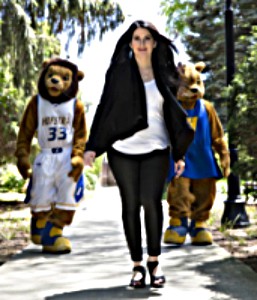 Radio Ink: Who are some of the folks on your roster?
Radio Ink: Who are some of the folks on your roster?
Cohen: We have a wonderful roster of talent. We cover all formats and have a few people in a variety of formats. In Country we work with Bob Kingsley and Kelly Ford and Chuck Wicks. In the Talk space, we work with John & Ken at KFI, Tim Conway Jr., and John Bachelor at WABC. We have so many incredible clients. I feel guilty to name some and not others.
I look at Dave Ryan, for example, who has been so dominant in Minneapolis, and Valentine, who is dominant in Los Angeles [at KBIG]. Then I look at somebody like TJ Taormina, who started as a kid producer working for Elvis Duran. TJ is a remarkable story. He went from being an intern for Elvis to one of many producers to one of the co-hosts to wanting to develop his own show. That’s something we worked on for a few years, and now he’s doing his own morning show in Boston for CBS and doing great. He was one of my very first clients. I’m so proud of him.
I love it when clients’ dreams come true. My clients become my babies. They become my children, and I want them to succeed and give them help and guidance along the way. I’m proud of his story and what he’s doing in Boston. He is doing it the right way.
Radio Ink: Why do you believe some talent fail?
Cohen: I think they are pulled in many directions, and sometimes, when there are so many things required of them, it’s hard to focus on the most important part — the programming, the content.
I have certain clients who are doing appearances five or six nights a week. That scares me. I see the importance of social media, but sometimes the requirements are so great that even that takes a lot of time out of the day. I worry when they’re working too much, especially the morning talent. I get worried when I see they’re exhausted. When they’re exhausted, their show will suffer.
It’s impossible to put in all the prep and research for the main job at hand, which is the show, yet I understand the needs of the company as well. That’s my concern — that talent is pulled in too many directions and putting in too many hours.
Radio Ink: Does management appreciate talent?
Cohen: I think they do. I think management is so busy and pulled in so many directions that they don’t have as much time as they used to to show appreciation and focus on talent. I don’t think there are tons of managers who don’t care. Managers are 24/7. They are overseeing multiple stations. It’s impossible to take care of your talent and make sure all their needs are achieved. Even air-checking, the little things like that we used to see all the time, nobody has enough time in the day in management.
I don’t think anything is intentional, but I almost wish managers could take a step back and say, “Is there something I could do to motivate my talent, help them achieve both on the air and off? Am I doing enough and taking the time they need instead of focusing on all the other tasks at hand and ignoring the talent a little?”
Radio Ink: How much hiring is based on gender? Are women considered equally, or are they still mostly considered for sidekick jobs?
Cohen: I definitely see it as one-sided. Most often people are looking for men, but not always. I think Cooper Lawrence is a good example — Cooper is at WBLI on Long Island, and she is the lead. She was on WPLJ in the morning and before that she did her own syndicated show. In the last two or three years, there have been more companies looking for a strong female lead.
It’s still few and far between. I do get a lot of calls looking for women, but the majority are for sidekicks or equal co-hosts. I would also say there is an increase in the amount of equal co-hosts that are sought after, as opposed to a sidekick. We’re getting a little better, but it’s still slow. It’s very far behind in Talk radio. We have a few great dominant ladies of Talk radio, but not enough. I’m cautiously optimistic watching music radio.
Radio Ink: About Talk radio: Is the reason that it’s mostly a male audience?
Cohen: Good question. I work with some male PDs, like Bill Hess. He gets it. He just put Mary Walter in mornings at WMAL. He’s always been a big supporter of female talent. I don’t think it’s that PDs don’t get it, and frankly, the pool is not all that big to choose from. It’s not like there are tons of women pushing to get into Talk radio.
They do exist, and often they are in smaller or medium markets, and maybe not showing up at every industry event. It takes some digging to find them. Yes, Talk audiences are mainly male, that is the dominant audience. I don’t think anyone is avoiding hiring women. I don’t think they are as exposed to strong female talent as they should be.
Radio Ink: Are women being paid fairly compared to men in the same position?
Cohen: I sure as hell want to make sure of that as an agent. I push for that. That’s one of the most important things to me personally, especially as a board member of the Alliance for Women in Media. It’s a huge concern of mine. We are lucky to work with some very dominant women in radio who do get paid well, but it’s an issue that still comes up.
Sometimes I do tend to wonder, and I don’t want to say all women and stereotype, but some women may not push as hard for themselves as much as a man to get an increase. I really like representing women because I want to fight for them. I enjoy all of my clients, but I do see that certain female personalities will not fight as hard as they should for themselves. They deserve it and should stand up for themselves.
I’m cautiously optimistic that things are getting better. For those not represented, they should not be fearful that management will think they’re being greedy or don’t appreciate the job they have. That’s something I hear often.
For example, let’s say I represent a man who’s in an on-air partnership with a woman. Several times I’ve heard in recent years, “My co-host doesn’t want to sign with an agent because she’s fearful they will view her as not being grateful for the position and she’s fearful for her job.” I hear that more so with women than men.
Radio Ink: What inspires you most about the talent you are seeing out there today? What bugs you?
Cohen: We have some of the most creative people in any business in the world. If you can do a radio show, you can do anything, especially a personality-driven show. If you can do a talk show on a music station or Talk station, you can do TV or speak before Congress, because you’re prepped and ready to go, you’re informed. I have huge respect for radio personalities. To me there’s nothing like it, and there is such creative genius out there.
Because management is busy doing so many different things, they don’t take the time to realize just how special the talent is. It’s such a unique business. And the creative genius can spill over into so many different areas.
What bugs me? I get a lot of calls from people who have a sense of entitlement. Take a step back and realize it’s not going to happen overnight. If you just got out of college or you’ve been doing radio for a year in a small market and don’t have a ratings story, don’t expect to end up in New York next year. I get a little irritated with people who don’t want to put in the work and time.
I get a little frustrated when I get a call saying, “I’ve done local radio for a year, but I want to be syndicated now.” Eric and I do a lot of syndication. We know the limitations and have a good idea of what can and will not work in this day and age. You don’t always need to be syndicated.
I understand for some it’s an ego thing, and for others it helps sell books or concert tickets. If you’re going to be syndicated, prove yourself in the market. If you’ve done a brilliant job and the show is worthy of syndicating, grow slowly. If you look at the history of successful syndicated shows, many of them started that way. But to just assume you’ll be syndicated, that frustrates me.
Now if I’m getting a call from somebody who’s dominant in a market and feels they’re ready to branch out, that’s a different conversation and needs to be weighed, but people who are just getting into the business and have a sense of entitlement, that frustrates me.
Radio Ink: Outside of anyone who works at the agency, tell us a few people you admire, and why.
Cohen: There are a lot. Because of my passion for news, even though I have not had the opportunity to personally work at a News station, I love picking Harvey Nagler’s brain. I love to hear his stories and see how his mind works. I’ve learned so much from him. He’s fascinating, and we can all learn a lot from him. Joan Hamburg is one person that makes me the happiest in the world, other than my family. Growing up in the radio business with Joan, I don’t know if there’s a luckier person than me. She molded the radio person I am today.
Radio Ink: You spoke a lot about mentoring, especially at WOR, about all the people who helped you. Talk about some of the things you do to pass that on.
Cohen: I think we all need to do that. It’s my pleasure to work with younger people. I had a lot of big sisters and brothers along the way. They know who they are, and I can’t thank them enough. We all had people who “brought us up” in some way.
I’m on the board of the Alliance for Women in Media, and we chair the Gracie Allen awards. This is the second year I’m the co-chair of both the luncheon and the gala. I see how receiving a Gracie changes a lot of women’s lives. I think women are not always good at patting ourselves on the back or having the “rah-rah moment.” I’ve seen the tears and how much it means to women to finally be recognized.
The scholarships we are able to give — we’re trying to raise more funds to commit to additional scholarships to help young people who can’t afford to do certain things. If everyone would give a little back, whether it’s their time or finances or both, we can change so many lives.
I’m also really involved with Hofstra University. I don’t feel like I’m doing something great by giving back, I’m happy that they want me. I’m honored they want to talk to me and include me in different aspects of the university. I’m so proud of those students. I was recently at WRHU, which won a Marconi two years ago and was nominated this past year. That’s pretty incredible. These students have access to things I did not, and they are embracing it.
I see more young women embracing these opportunities than when I was in college 20 years ago. That excites me. I see more women in management positions at their radio stations and getting great internships and working their butts off 80 hours a week. It’s so important to chat with them, just as I had people to talk to, who maybe changed my ideas of what I wanted to do. I had people who spent the time to train me. It’s important to mentor the future. Anything I can do to give back and express my gratitude for what I’ve been offered.
Radio Ink: What are your goals from here forward?
Cohen: Other than world domination [laughing]? I love what I’m doing and want to do it forever. I want to continue to make Eric proud and build the Weiss Agency. I have the best boss. He allows me to do what I want to do and explore things. I want to continue taking care of my talent and be passionate about building their careers. I plan to take care of talent for many, many years. The way we deliver content is evolving, and I want to continue to learn and grow and evolve just as our industry is evolving.
Content is always the most important thing, so staying relevant and learning something new every day and bringing that to my clients, helping them achieve their goals and reach new heights — when you see a client’s dreams come true, there’s nothing more exciting than that.
On a personal level, I have certain aspirations. May not sound like much, but I would like to work out three days a week, and that has not happened yet. I would like to learn how to play the guitar, finally. My parents bought a guitar for me when I was in high school, and it’s still sitting in their house.
 Radio Ink: You just had a baby girl. Do you think you would encourage her to get into media?
Radio Ink: You just had a baby girl. Do you think you would encourage her to get into media?
Cohen: Absolutely. I want her to do whatever she wants and I will fully support her, but would I be thrilled if she wanted to get into this business or something similar. If this is what she wants to do, game on.

